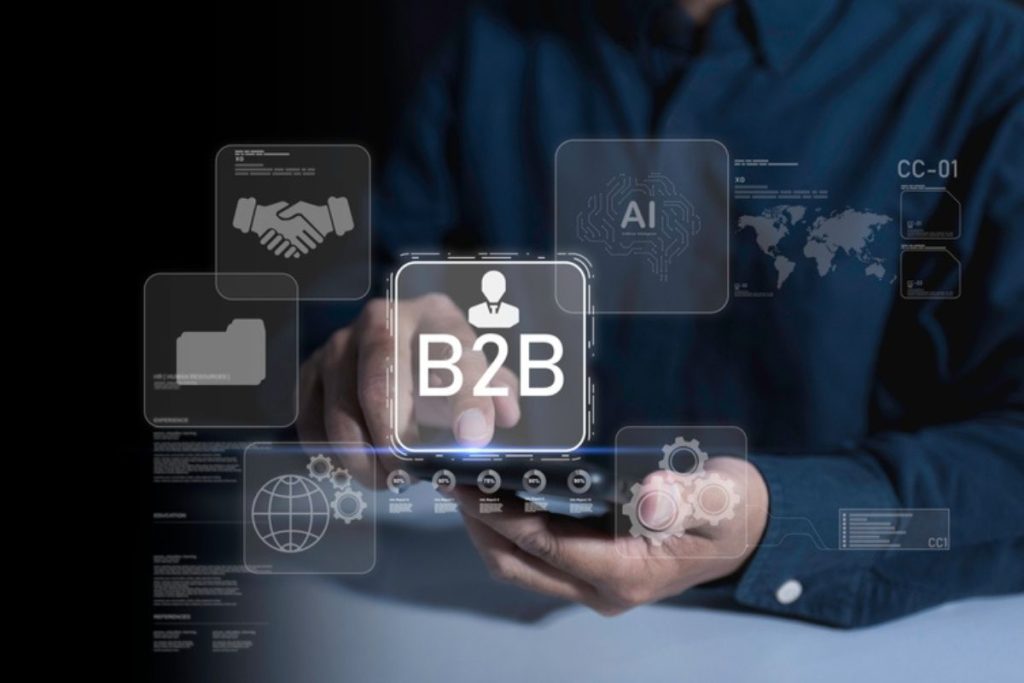How AI Automation For B2B boosts productivity by automating repetitive tasks
Unlock Effectiveness and Growth With AI Automation for B2B Business
AI automation is changing the landscape for B2B business. It minimizes and streamlines operations dependence on human treatment. This change allows services to make quicker, data-driven choices. As organizations explore which refines to automate, they have to also think about the right devices to apply. However, obstacles continue to be in adopting AI innovation. The ramifications of these changes might form the future of lots of companies in means yet to be fully understood.
Recognizing AI Automation in the B2B Context
As companies progressively look for performance, understanding AI automation in the B2B context becomes vital. AI automation entails using innovative modern technologies to streamline operations, reduce human treatment, and boost decision-making procedures. In the B2B landscape, this can show up in numerous kinds, such as automating customer support communications, taking care of supply chain logistics, or maximizing advertising projects. Business can take advantage of AI to evaluate enormous datasets rapidly, enabling them to identify fads and understandings that notify tactical choices. Additionally, AI systems can integrate flawlessly with existing modern technologies, supplying a cohesive platform for taking care of service functions. This understanding prepares for companies to check out how AI can transform their procedures, enhance efficiency, and ultimately foster sustainable development in an affordable market.
Trick Benefits of Implementing AI Automation

Identifying Processes Appropriate for Automation
Just how can B2B business successfully identify procedures appropriate for automation? A methodical strategy starts with mapping out existing workflows to identify repeated and lengthy tasks. These tasks commonly consist of information access, invoicing, and client follow-ups. Companies need to assess the frequency and volume of these processes, as high-frequency jobs present the best opportunity for efficiency gains. Additionally, assessing the capacity for error reduction and resource allocation can highlight areas ripe for automation. Engaging workers in discussions can likewise supply understandings right into which procedures prevent productivity. Finally, companies ought to take into consideration the alignment of automation with their calculated objectives, ensuring that the recognized processes add to total service purposes, ultimately assisting in smoother operations and boosted development.

Picking the Right AI Devices for Your Service
When B2B companies consider automating their processes, choosing the best AI tools comes to be crucial for achieving desired end results. Companies should begin by assessing their distinct demands and goals, guaranteeing alignment with business objectives. Examining the adaptability, combination, and scalability capabilities of possible tools is critical, as these variables figure out lasting performance (Minarik AI). Organizations ought to likewise think about user-friendliness and the degree of assistance given by suppliers, as these components can influence effective execution. On top of that, assessing consumer evaluations and study can offer insights into exactly how specific AI options carry out in real-world scenarios. By carefully choosing AI devices that fit their operational needs, B2B companies can enhance efficiency and drive growth while reducing prospective interruptions
Overcoming Obstacles in AI Fostering
B2B business commonly experience substantial difficulties in adopting AI innovations, particularly concerns related to information quality and resistance to transform management. Poor information quality can prevent the effectiveness of AI systems, while worker reluctance to accept brand-new processes can delay implementation initiatives. Addressing these difficulties is vital for effective AI combination and maximizing its prospective benefits.
Information Quality Issues
Assuring high information high quality is important for the effective adoption of AI modern technologies in business-to-business atmospheres. Imprecise, incomplete, or out-of-date data can severely prevent AI campaigns, resulting in wrong understandings and poor decision-making. Companies usually deal with difficulties such as information silos, disparities throughout various resources, and a lack of standardized data styles. To get rid of these problems, companies need to spend in information cleaning, assimilation, and administration processes (Growth Systems For B2B). Carrying out durable data administration practices guarantees that the information fed right into AI systems is dependable and appropriate. Cultivating a society of data quality recognition amongst workers can improve information precision over time. By dealing with information top quality worries, B2B companies can launch the complete potential of AI automation, driving efficiency and development
Modification Monitoring Resistance
Getting rid of modification monitoring resistance is essential for the effective application of AI initiatives within companies. Workers frequently show apprehension in the direction of AI, fearing job variation or modifications to established process. To combat this, management must foster a society of openness and continuous discovering. Offering training and clear interaction regarding the advantages of AI can construct and minimize problems count on. Involving employees in the shift procedure encourages partnership and lowers resistance. Furthermore, recognizing change champions within groups can facilitate smoother acceptance of AI innovations. As organizations browse this change, dealing with psychological and sensible worries connected to AI adoption becomes important for making the most of the innovation's possible and making certain a seamless integration into existing processes.
Measuring the Effect of AI Automation
Determining the effect of AI automation in B2B business needs a clear understanding of crucial efficiency signs (KPIs) that line up with organization purposes. Reliable information evaluation strategies are crucial for interpreting the outcomes, while durable ROI analysis methods assist figure out the monetary benefits of automation initiatives. With each other, these parts provide a comprehensive framework for evaluating AI's contributions to business success.
Trick Efficiency Indicators
Secret performance indicators (KPIs) act as crucial devices for B2B business to evaluate the efficiency of AI automation initiatives. By developing clear metrics, companies can determine improvements in functional performance, expense reduction, and revenue development straight attributable to automation. Common KPIs consist of cycle time decrease, error prices, client contentment scores, and employee productivity degrees. These signs give insights into how AI systems are maximizing processes and enhancing total performance. In addition, tracking KPIs allows companies to recognize areas for additional improvement and to straighten AI automation efforts with strategic service objectives. Inevitably, a well-defined structure of KPIs assurances that B2B companies can quantitatively examine the impact of AI automation on their procedures and drive continuous development.
Data Analysis Strategies
Efficient information analysis methods play a vital duty in assessing the influence of AI automation within B2B companies. By using statistical approaches, organizations can recognize trends and patterns in operational information, allowing them to examine the performance acquires attained through automation. Methods such as regression evaluation and time collection forecasting supply understandings into how AI-driven procedures affect productivity and decision-making. Minarik AI. Additionally, information visualization devices can properly interact findings to stakeholders, promoting educated tactical decisions. Artificial intelligence algorithms can better boost evaluation by anticipating future outcomes based upon historical information, providing workable insights. Inevitably, these methods enable B2B business to measure success and enhance their AI see this automation initiatives, making certain positioning with organization goals and enhancing general efficiency
ROI Evaluation Approaches
Assessing the roi (ROI) of AI automation is necessary for B2B companies seeking to recognize the monetary effects of their technological efforts. Firms can employ numerous ROI assessment techniques to determine the effectiveness of AI applications. One effective method entails calculating cost financial savings by contrasting operational expenditures prior to and after automation. Furthermore, determining efficiency renovations with essential efficiency indications (KPIs) aids evaluate the benefits of AI. Consumer fulfillment metrics can likewise provide understandings into the impact of automation on service quality. To guarantee an extensive assessment, business need to take into consideration both direct abstract advantages and monetary returns, such as boosted decision-making abilities and affordable advantage. This complex evaluation enables B2B business to make educated choices regarding future financial investments in AI technology.
Future Patterns in AI Automation for B2B Business
What developments lie in advance for AI automation in B2B firms? Arising fads suggest a significant shift towards enhanced data analytics abilities, allowing services to make more educated choices (AI Automation For B2B). Anticipating analytics will certainly come to be progressively essential, permitting business to expect market adjustments and client needs. Additionally, the integration of AI with Net of Points (IoT) innovation is expected to enhance operations by giving real-time understandings and automation of processes. Companies will also concentrate on boosting client experiences with individualized advertising driven by AI algorithms. Advancements in natural language handling will certainly assist in far better communication in between companies and customers. As these fads evolve, B2B companies should adapt to utilize AI automation successfully, making certain sustained development and competitive benefit
Often Asked Questions
What Industries Benefit the Most From AI Automation in B2B?
Manufacturing, finance, healthcare, and logistics sectors profit the most from AI automation in B2B. These fields leverage AI to optimize procedures, boost decision-making, and improve general functional efficiency, driving considerable development and innovation.
How Does AI Automation Influence Employee Duties and Responsibilities?
AI automation reshapes worker duties and responsibilities by simplifying repeated jobs, allowing employees to concentrate on strategic efforts. This change fosters skill advancement, boosts productivity, and encourages collaboration, eventually driving organizational development and technology.
What Are Common False Impressions About AI Automation in B2B?
Common misunderstandings regarding AI automation in B2B include anxieties of work loss, ideas that AI can totally change human judgment, and ignoring the significance of partnership in between AI systems and workers for suitable outcomes. - Minarik AI
Exactly How Can Businesses Make Certain Data Personal Privacy With AI Automation?
Businesses can ensure information privacy with AI automation by carrying out durable encryption methods, adhering to regulative conformity, conducting normal audits, and training staff members on data managing techniques to reduce threats and protect delicate details. (AI Automation For B2B)
What Are the Expenses Related To Implementing AI Automation?
The expenses linked with applying AI automation include software application procurement, infrastructure upgrades, training workers, recurring upkeep, and prospective downtime during assimilation. Additionally, business might incur expenses connected to data safety and security and conformity actions.
Determining the influence of AI automation in B2B companies needs a clear understanding of key efficiency indications (KPIs) that align with service purposes. Key performance signs (KPIs) serve as necessary tools for B2B companies to evaluate the efficiency of AI automation initiatives. Efficient data evaluation methods play a necessary function in examining the effect of AI automation within B2B business. Reviewing the return on investment (ROI) of AI automation is necessary for B2B business seeking to understand the financial effects of their technical efforts. What advancements lie ahead for AI automation in B2B firms?